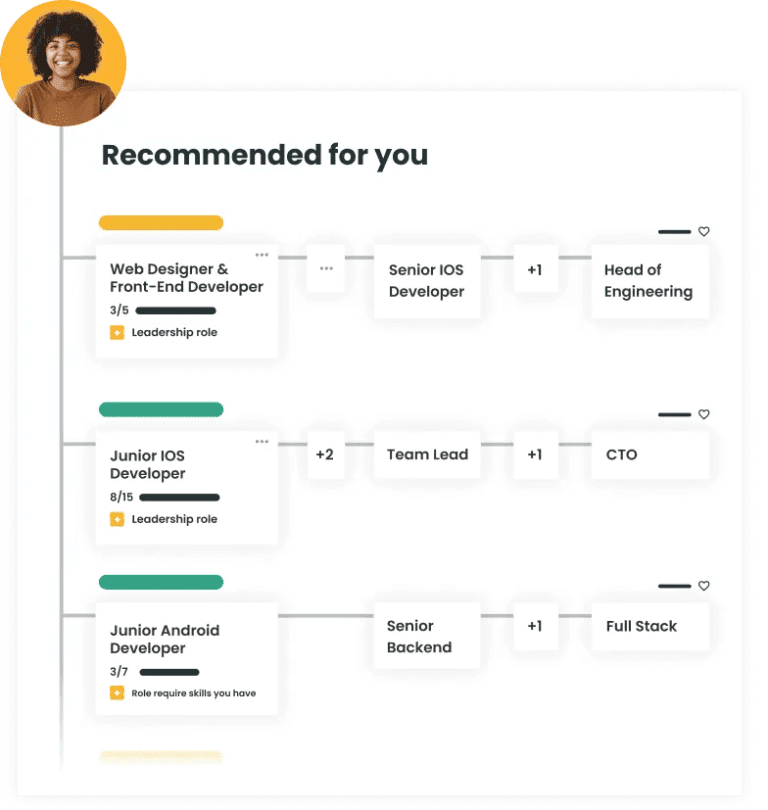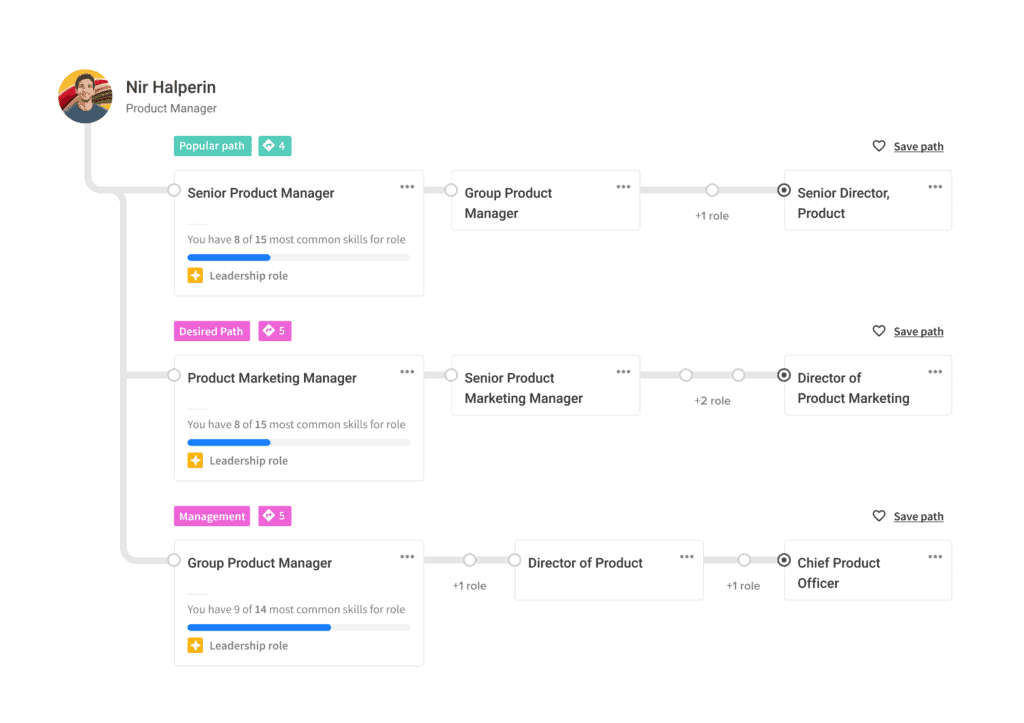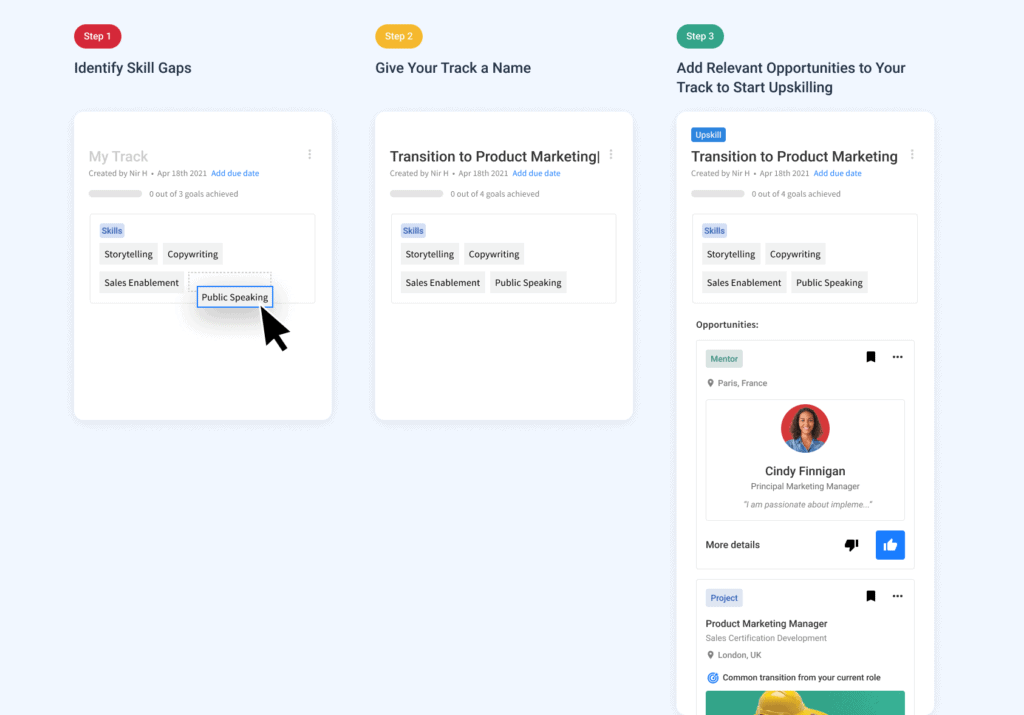
A Q&A on creating virtuous work cycles that empower employees to expand their skills By Nicole Schreiber-Shearer, Future of Work Specialist at Gloat Reducing turnover has always been an HR priority—but it’s taking on an entirely new meaning in the

By Nir Halperin, Senior Product Manager @ Gloat
September 16, 2021

I didn’t always want to be a Product Manager. First, I wanted to play basketball. Then, I got my master’s degree in education. After that, I took a role as a Media Analyst. It took a few more years, pivots, networking calls, and job hunts to get where I am today; envisioning and building technology that can change the way we work for the better.
Although the steps in my journey are unique, my story isn’t—and that’s exactly why I’m excited about what we’re introducing here at Gloat. Like most employees today, my career hasn’t followed a straight path. There have been plenty of twists and turns, and the fact that 60% of employees today are rethinking their careers shows I’m not alone in my desire for change.
Until now, we haven’t had much help navigating these shifts. As someone who has benefitted from my own career pivots, I knew that needed to change. And with our game-changing Workforce Agility Platform, I knew our team at Gloat could make a difference. So, I’m thrilled to announce the launch of Career Planning, a new offering that gives employees the tools and guidance they need to reach their ever-evolving career goals.
By now, most leaders know that the employee value proposition is getting an update. Today, we’re seeing this in the form of elevated turnover rates and quiet quitting, which indicates that many organizations are struggling to deliver against their workforce’s expectations. Visibility into career growth opportunities is a big part of the change employees want to see. Our research shows that a lack of growth opportunities is the number one reason people leave their companies.
For Gloat, Career Planning is a natural progression, building on our Talent Marketplace’s capabilities. Having brought Talent Marketplaces to life at many of the world’s leading global organizations, we understand the supply and demand of talent within an organization and how to match employee skills and aspirations to opportunities. This, in turn, has provided us with a rich data set on both employee capabilities and what tasks and skills are needed to excel in specific roles.
Now, beyond matching someone to an immediate opportunity in the form of a project, role, or mentor, we’re helping them see the series of opportunities ahead of them and the paths they can take to build a meaningful career within their company.
From the start, we had big goals for Career Planning. We wanted to help employees discover and chart possible paths their careers could go in, and find ways to take immediate action by growing their skill sets. We wanted to open their eyes to new development opportunities, creating a win-win for both employees and the organizations they work for.
To meet these goals, we introduced two modules that can be used independently, or together, to create a holistic career planning solution. Here’s what’s included:
The Paths capability presents users with a few choices for what direction their career can take, depending on their skills, experience, and interests. These include:
My favorite part about Career Paths is that it can help employees discover roles they never even knew existed within their company. It’s a new way for people to develop and grow, and for organizations to tap into talent that might otherwise have been overlooked.
Want to see what Paths looks like in action? Let’s use my role as Senior Product Manager as an example. When I’m thinking about how I’m going to progress my career, Paths will give me a few options. I might see something like VP of Product Management under Popular or Management.
But what if I want to move into Marketing? In that case, my Desired Path might show roles in something like Product Marketing, which is going to let me stay in the product domain while I steer my career in a direction that I’m really interested in.

When it’s time to start strategically working towards career goals, Tracks provides an immediate solution that lets both employees and managers play an active role in professional development. In addition to hand-selecting projects, employees can sit down with their managers and identify growth opportunities based on the suggestions that Tracks generates. To make things even more efficient, L&D teams can also pre-curate tracks to align with upskilling goals for a specific talent pool.
There are three ways to use Tracks:
Tracks include boards so users can monitor their progress and see what they’ll need to do next.

The most exciting part of launching Career Planning has been designing it with our customers and seeing it come to life for their employees. At launch, our customers saw 81% of employees leveraging Career Planning to explore their possible Career Paths. One worker shared, “This is the best advice around career planning that I’ve received within 10 years at my company.”
Core to this success is the way Career Planning puts the employee at the center of the experience. We use the data from our Talent Marketplace to create a full picture of who the employee is and what they’re working to achieve, rather than positioning their skills as resources to be leveraged as a cog in a larger machine. Career Planning’s curated paths and opportunities let employees chart their own path forward because, at the end of the day, they’re the ones in the driver’s seat.
As my own professional journey has taught me, changing career paths isn’t a weakness or a sign of indecision. Instead, it demonstrates an ongoing commitment to learning and evolving. Now, every employee can take their commitment to the next level with Career Planning.
To learn more about what it takes to fuel employee-led career growth, find out how a workforce agility platform helps leaders grow and develop their people.

A Q&A on creating virtuous work cycles that empower employees to expand their skills By Nicole Schreiber-Shearer, Future of Work Specialist at Gloat Reducing turnover has always been an HR priority—but it’s taking on an entirely new meaning in the

We’re spreading the word about the cheers-worthy benefits that skills strategies have to offer By Nicole Schreiber-Shearer, Future of Work Specialist at Gloat It’s not your imagination—skills are in the spotlight. Gartner named skills management as one of the most

Learn how Alex Badenoch drives successful change initiatives with measurable objectives By Nicole Schreiber-Shearer, Future of Work Specialist at Gloat When it comes to transformation, there’s a serious gap between potential and reality. Companies that view their change initiatives as
This info will help our workforce agility experts personalize your experience.